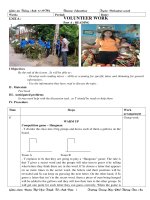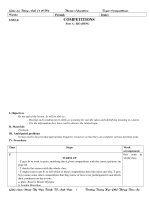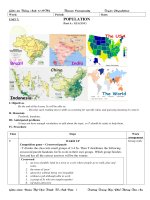Bài soạn Unit 6 Tieng Anh 11 chuan
Bạn đang xem bản rút gọn của tài liệu. Xem và tải ngay bản đầy đủ của tài liệu tại đây (280.27 KB, 15 trang )
Giáo án Tiếng Anh 11 (CTC) Theme: Education Topic: Competitions
Week: Period: Date:
UNIT 6: COMPETITIONS
Part A : READING
I. Objectives
By the end of the lesson, Ss will be able to :
- Develop such reading micro-skills as scanning for specific ideas and identifying meaning in context.
- Use the information they have read to discuss the related topic
II. Materials
Textbook
III. Anticipated problems
Ss may need to be provided appropriate linguistic resources so that they can complete various learning tasks.
IV. Procedure
Time Steps Work
arrangement
5’
WARM UP
- T gets Ss to work in pairs, matching the 4 given competitions with the correct pictures on
page 66.
- T checks the answer with the whole class.
- T might want to get Ss to tell which of these competitions they like most and why. T gets
Ss to name some other competitions that they know or have ever participated in and elicits
their comments on the events.
a. Quiz: Road to Mount Olympia
b. London Marathon
Pair work &
whole class
Giáo viên: Đoàn Thò Vẹn Trinh- Tổ Anh Văn Trường Trung Học Phổ Thông Tân An1
Giáo án Tiếng Anh 11 (CTC) Theme: Education Topic: Competitions
c. Sao Mai Television Singing contest
d. Olympic Games
7’
BEFORE YOU READ
- T introduces the topic of the lesson and gets Ss to work in pairs and answer the questions
on page 67 .
- T calls on some Ss to answer the questions . T should ask Ss to give reasons for their
answers . T helps Ss to express their ideas .
- T elicits comments from the class asks Ss to guess what they are going to read about
Pair work &
whole class
8’
WHILE YOU READ
Set the scene: You are going to read about a school’s competition. Then you do the tasks
that follow
TASK 1
- T gets Ss to read thye passage silently and then do Task 1. T may want to remind Ss of
the strategies for guessing the meaning of new words. For eample, Ss should look for the
instances of the new words in the text and read around them. Ss use the context in which
the words occur and their knowledge of word formation to understand the meanings . E.g
the word “representative ” found in line 1 may refer “someone who representative a
group ” . Ss can undersand this meaning thanks to the phrase “the representatives of three
classes ” and their knowledge that representative derives from “represent ”
- T checks the answers wihth the whole class
- T might want to check that Ss understand all these words correctly by calling one some
Ss to tell the meanigng of the words in Vietnamese
Answer :
1 . d 2 .f 3 . e 4 . c 5 . b 6 .a
TASK 2
- T checks if Ss can answer the comprehension questions in Task 2 without having to read
the passage again . If Ss cannot , T gets them to read the questions carefully . T might
want to give them some tips to do the task :
+ first , Ss should skim the 6 questions to understand them . As Ss do this they :
* underline the key words to decice what information they need for find in the text . E.g
the keywords in Question 1 are “the 5th annual English Competition . ”
* look for question word like “why ” which indicates Ss shold read for specific thing like a
reason .
+ Then they should go back to the passage and locate the key words in the passage .
+ then tey should read aroud the key words carefully to find the answer .
- T gets Ss to check their answers with s peer
- T call on some Ss to read aloud their answers and ask them to explain their chioces
- T gives the correct answers
Answer :
1 . The representatives of three classes of the speaker’s school (line 1 , paragraph 1 )
2 . The aim was to stimulate the spirit of learning English among students (lines 3 – 4 ,
paragraph 1 )
3 . The students’ Parents Soc iety (line 4 , paragraph 1 )
4 . They had to complete 5 activites in all . On completion of each activity , they had to
answer the questions in the worksheets within 2 minutes (lines 1 – 4 , paragraph 2 )
5 . They had to obsevre and score the students’ performance . A maximum score for each
activity was 15 . At the end of the competition they would annouce the total score will be
the winner (lines 4 – 7 , paragraph 2 )
Individual
work , pair work
& whole class
Giáo viên: Đoàn Thò Vẹn Trinh- Tổ Anh Văn Trường Trung Học Phổ Thông Tân An2
Giáo án Tiếng Anh 11 (CTC) Theme: Education Topic: Competitions
8’
6 . A set of CDs for studying English and an Oxfoxd Advanced Learner’s Dictionnary
(lines 8 – 9 , paragraph 2 )
TASK 3
- T checks if Ss can answer the comprehension questions in Task 3 without having to read
the passage again . If Ss cannot , T gets them to read the question carefully . T might want
to remind Ss of the tips to do the task :
+ First , Ss should skim the 4 questions to understand them . As Ss do this they underline
the key words to decide what information they need to find in the text
+ Then they should go back to the passage and locate the key words un the passage .
+ Then they should read around the key words carefully to find the answer
- T gets Ss to check their answers with a peer .
- T call on some Ss to write their answers on the board and ask them to explain their
choices .
- T gives the correct answers :
Answer
1.... to recite / complete the poem because he could not remember the last sentence
2 ..... became the winner of the competition .
3...... 60 points
4 .... “For me the important thing was our participation in the competition and the
enjoyment we had from it”
Individual pair
work & whole
class
7’
AFTER YOU READ
- T reads the the poem aloud once or twice and gets Ss to repeat each line after him / her .
T shold draw Ss’ attention to the rhythm and intonation when recting the poem .
- T lest Ss practise recting the poem in their own groups T goes aroud and offters help .
- T calls on different groups to read the poem and asks the class to decide who the best
performers are .
- T teaches new words (e.g “patter ” “window – pane ” ) and then gets Ss to translate the
poem into Vietnamese .
- T calls on different groups read their translations to the class . T asks the class to decide
whose translation is the best
Suggested translation:
Bạn có thích ngắm bầu trời đêm tối
Sao bồi hồi tỏa ánh sáng long lanh
Có thích không những buổi sáng mát xanh
Ngàn mây trắng lững lờ trôi phiêu lãng
Tôi thích lắm nắng sớm mai mùa hạ
Tỏa nhẹ nhàng theo mỗi bước chân ta
Thích những khi cuộn mình nghe mưa lạnh
Lộp bộp rơi trên ô cửa hiên nhà
Group work &
whole class
3’
WRAPPING UP
- T summarises the main points of the lesson
- For homework , Ss write a paragraph to explain whether and why they would agree or
disagree with the statenment that “It is not important whether we win or lose a competition
. The important thing is our participation in it and the enjoyment we have from it ”
Whole class
Giáo viên: Đoàn Thò Vẹn Trinh- Tổ Anh Văn Trường Trung Học Phổ Thông Tân An3
Giáo án Tiếng Anh 11 (CTC) Theme: Education Topic: Competitions
Week: Period: Date:
UNIT 6: COMPETITIONS
Part B: SPEAKING
I. Objectives
By the end of the lesson, Ss will be able to:
- Ask for and give information about types of competitions.
- Talk about a competition or contest.
II. Materials
Textbook, handouts.
III. Anticipated problems
Ss may have limited linguistic resources for discussion, so T should be ready to assist them.
IV. Procedure
Time Steps Work
arrangement
7’
WRAM UP
- T prepares pictures of the 3 famous TV game shows “Who wants to be a millionaire ?”,
“1 vs 100” and talent show “Pop Idol”.
- T shows the pictures to Ss and gets them to say the names of the games in Vietnamese.
- T elicits what Ss know about these games and if there are similar ones in Vietnam.
- T introduces the topic of the lesson: Talking about competitions and contests.
Pop Idol (ThÇn tỵng ©m nh¹c)
Who wants to be the millionaire ( Ai lµ triƯu phó)
1. vs. 100 (§Êu trêng 100)
About the games:
1. Pop Idol is a British television series which debuted on ITV1 on October 5, 2001;
the show is a talent contest to decide the best new young popular music singer, or
‘pop idol’, in the UK, based on viewer voting and participation. The Idol series
has become an international franchise; it has spun off many successful shows such
as Idol, American Idol, Idols, Canadian Idol, Australian Idol, Idols West Africa,
Indian Idol, Indonesian Idol, New Zealand Idol, Philippine Idol, Nouvelle Star,
Deutchland sucht den Super Star, Singapore Idol, Malaysian Idol, Music Idol,
Idolos Brazil, Idolos Portugal, and Super Star.
In Vietnam we are going to have “Vietnam Idol”, the Vietnamese version of Pop Idol. It
is to be aired in summer of 2007 on HTV9, the official channel of Ho Chi Minh city.
2. Who wants to be the millionaire ? In the UK, who wants to be a millionaire ? is a
television game show which offers a maximum cash prize of one million pounds
for correctly answering successive multiple-choice Qs of increasing difficulty. The
show was exported to many other countries, all of which follow the same general
format. In Vietnam we have “Ai lµ triƯu phó?”, the Vietnamese version of the
British gane show. The maximum cash prize is one hundred and 20 million VND.
Whole class
Giáo viên: Đoàn Thò Vẹn Trinh- Tổ Anh Văn Trường Trung Học Phổ Thông Tân An4
Giáo án Tiếng Anh 11 (CTC) Theme: Education Topic: Competitions
3. 1. vs. 100 is a game show created by a Dutch TV production company that is aired
in several countries. In the game one person competes again 100 others for a
chance to win a large cash prize. The game first aired in the Netherlands.
This version in Vietnam is named “Arena 100” (§Êu trêng 100) and listed in the Vietnam
Record Book as the biggest show with the highest number of players, 100.
10’
TASK 1
- T introduces the task and gets Ss to do it individually and then compare their answers with
a peer. T should encourage Ss to guess the meanings of the new words, if any.
- T explains or elicits the meanings of the new words, T might also want to get Ss to name
some contests under each category. E.g: General knowledge quiz includes “Hµnh tr×nh v¨n
ho¸”, “Ai lµ triƯu phó”, etc. Singing contests include “Sao Mai”, “Sao Mai ®iĨm hĐn”, etc.
- T calls on different pairs to report their answers. T should encourage Ss to explain why
they like or dislike a game/contest. T helps Ss to express their ideas when necessary.
Individual
work,pair work
& whole class
10’
TASK 2
- T introduces the task and calls on one or two pairs of Ss to read aloud the sample
dialogue. T corrects errors, if any.
- T goes over the table of useful expressions on page 69 and explains new words to Ss
when necessary. T might also want to elicit the structures that are used for asking for and
giving opinions about contests. T might want to write these structures on the board and
gets Ss to do some practice before putting them in groups and do the task.
E.g:
Asking for opinions:
What do you think about ...?
What’s your opinion about ...?
How do you feel about ...?
Do you like ...?
Giving opinions:
I think ....is/are boring/silly/dull
- T puts Ss into pairs and gets them to make similar conversations to the sample dialogue,
using the structures and vocabulary they have learned.
- T goes around to check and offer help.
- After checking that Ss have finished the task, T calls on different pairs to perform their
conversations.
- T elicits comments from the class and provides feedback.
Pair work &
whole work
15’
TASK 3
- T puts Ss into groups of 3-4. T tells each group to choose a famous TV game/talent show
or competition/contest and work out details about it. They should not let other groups
know what game/contest it is.
- T goes around to offer help.
- After Ss have finished, T calls on each group to come to the front. The whole class will
ask Qs about the game/contest and guess what game/contest it is.
Group work &
whole class
3’
WRAPPING UP
- T summarises the main points of the lesson.
- For homework, Ss write a paragraph about a game show/contest they like, using TASK 3
as guiding Qs.
Whole class
Giáo viên: Đoàn Thò Vẹn Trinh- Tổ Anh Văn Trường Trung Học Phổ Thông Tân An5
Giáo án Tiếng Anh 11 (CTC) Theme: Education Topic: Competitions
Week: Period: Date:
UNIT 6: COMPETITIONS
Part C: LISTENING
I. Objectives
By the end of the lesson, Ss will be able to:
- Develop extensive listening skills.
- Use the information they have listened to for other communicative tasks.
II. Materials
Textbook, cassette tapes, handouts.
III. Anticipated problems
Ss may not have sufficient vocabulary to talk about the topic, so T should be ready to assist them.
IV. Procedure
Time Steps Work
arrangement
5’
WARM UP
Jumbled words
(To teach vocabulary and leads Ss to the topic )
- T divides the class into groups of 3 or 4
- T gives each group one card containing 10 words whose letter are jumbled and asks
Ss rearrange the letter to make good words . The group which finishes the task first
with the most correct words will be the winner
The card
Giáo viên: Đoàn Thò Vẹn Trinh- Tổ Anh Văn Trường Trung Học Phổ Thông Tân An6









